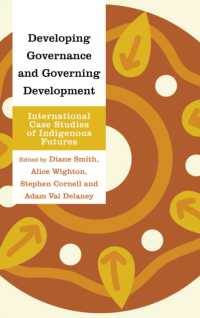Full Description
This anthology combines an intercultural approach with intergenerational ethics to address critical environmental challenges. Written by scholars from all over the world, including Canada, the US, New Zealand, Nigeria, Ethiopia, Japan, the UK, China, and Spain, this book offers new perspectives on how to foster sustainable societal practises that draw on the past and are fair to future generations. It introduces the Māori idea that views all things and human generations in layered relations; Indigenous accounts of spiralling time and reciprocities among ancestors and descendants; the philosophical dimensions of Chinese conceptions of ancestor spirits and future ghosts; and African accounts of anamnestic solidarity among generations. These ideas influence proposals for how to confront ending worlds and address the environmental future of humanity, making this book a valuable resource for scholars and students of environmental law and policy, environmental humanities, political science, and intercultural and comparative philosophy, as well as policymakers.
Contents
Introduction: why approach intergenerational justice from intercultural philosophy Hiroshi Abe, Matthias Fritsch and Mario Wenning; Part I. Indigenous Philosophies on Justice Between Generations: 1. Indigenous philosophy and intergenerational justice Krushil Watene; 2. Climate ethics and intergenerational reciprocity in indigenous philosophies Matthias Fritsch; 3. Intergenerational justice and the environment in Africa Workineh Kelbessa; 4. Reasonabilism, homeostasis and intergenerational justice in African thought Joseph Agbakoba; Part II. Intergenerational Ethics in Dialogue with Confucianism and Daoism: 5. Ghosts and intergenerational justice: a Confucian perspective Yat-hung Leung and Mario Wenning; 6. Intergenerational ethics and sustainability: a Confucian relational perspective Marion Hourdequin; 7. Moral motivation for future generations, naturally: a Mencian proposal Jing Hu; 8. Transience, responsible transformation and deep time in Daoist thought James Miller; Part III. Humanity Facing the Near Environmental Future: 9. Double intergenerational responsibility: from a west-eastern view Hiroshi Abe; 10. Guidelines for a global constitutional convention for future generations Stephen Gardiner; 11. Philosophy for an ending world.








